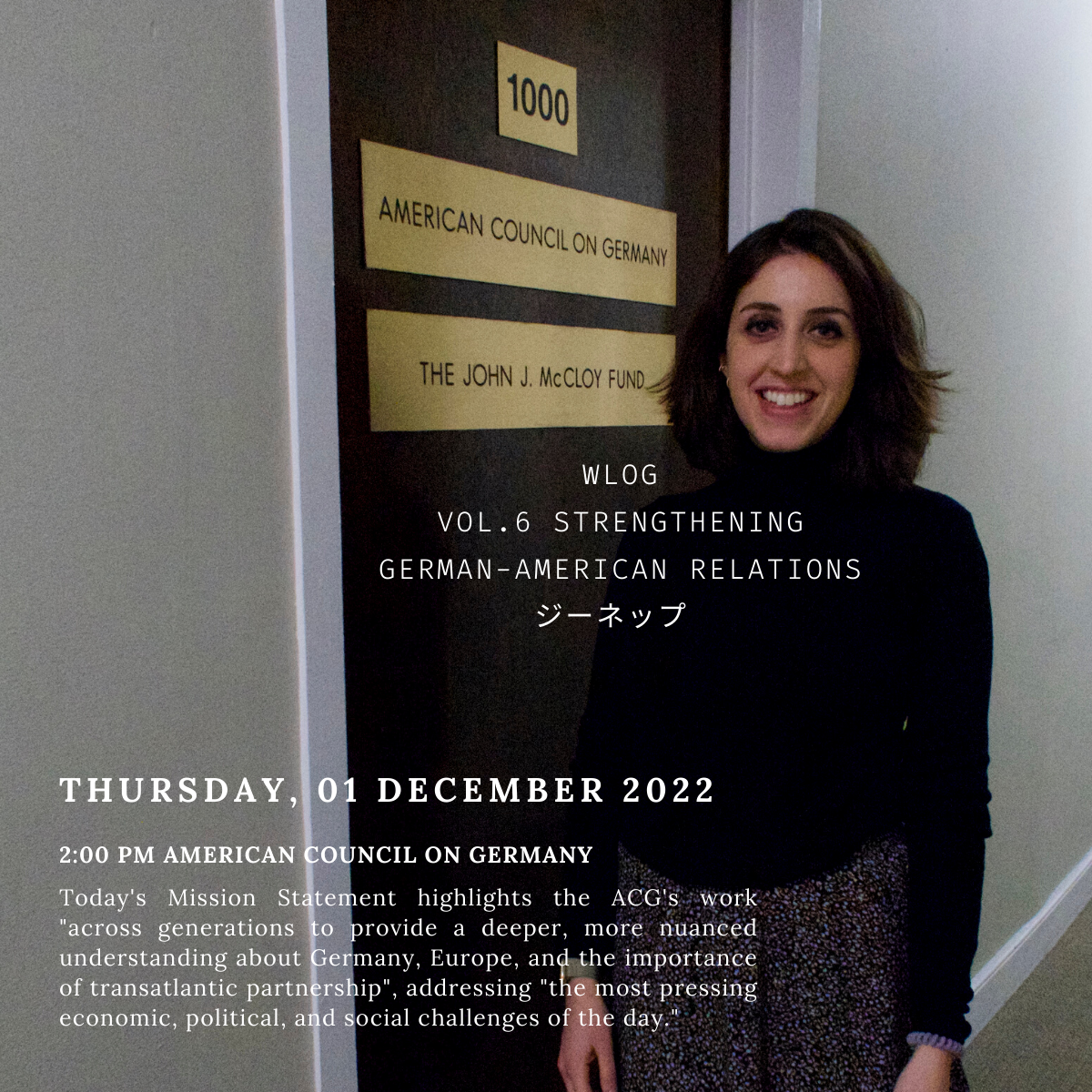#2022 wlog vol. 6
If you are interested in German-American relations. Continue reading, as I am going to introduce a very important organization: The American Council on Germany!
I heard too late about it. So, please share it with everyone you think might be interested now – or in the future!
What is the American Council on Germany?
The American Council on Germany (or simply ACG) is an independent, nonpartisan* nonprofit organization with the aim to strengthen German-American relations.
It was founded right after World War II, in 1952**, in New York. With the devastating aftermath of the war, the ACG was committed to promote reconciliation and understanding between Germans and Americans. With that in mind, the Council’s first mission statement stressed that“strengthening of understanding is essential if the relatively inexperienced German democracy is to develop, if NATO is to survive, and if Germany is to play the part which she must in a united Europe, in a free world.”
The beginning years of the Council were marked by educational conferences and discussions informing and engaging Americans about political and economic developments in Germany during its path towards a stable and strong democracy. Leading German policymakers were invited to the Council in the United States to share their insights and inform U.S. leaders about Germany’s situation and challenges.
What does the ACG do today?
As our world changes, so did the ACG’s work. In the past 70 years Germany emerged to anchor democratic values, to become an economic powerhouse, and to have a leading role in Europe. Considering the change and challenges in our societies and environment, the ACG is now working “across generations to provide a deeper understanding about Germany, Europe, and the importance of transatlantic partnership.” In our interconnected, digital, and diverse environment ACG offers a variety of events and initiatives that address economic, political, and social challenges and questions from different perspectives across the Atlantic.
The events commitment is twofold:
First, shaping and understanding the present. Here, the ACG informs and connects Germans and Americans on multiple levels: online and offline. This is done through weekly webinars and video discussions as well as in working groups. The webinars cover a wide range of current and pressing topics, such as food security and the economic implications of the war in Ukraine or public opinion in times of geopolitical turmoil.
Second, working on the future challenges together. Here, the ACG has two fascinating programs.
The Young Leaders Conference
The flagship initiative, which was launched almost 50 years ago, is the American-German Young Leaders Conference. By bringing 25 participants from each side of the Atlantic the conference fosters intensive dialogues and exchange among the next generations of transatlantic leaders and decision-makers. The future leaders are from various sectors such as academia, business, journalism, or public sector. Please find detailed information here: American-German Young Leaders Conference
Fellowships
American and German journalists, scholar, and other mid-career professionals have the unique opportunity to travel overseas and get a personal experience from their transatlantic counterparts. Fellows work on their proposed research project and can “gain a better understanding of how issues are approaches on the other side of the Atlantic.” There are a variety of fellowship programs each targeting a specific sector or topic. Check the following website for details and announcements made: Fellowships
Of course, there are other organizations with the aim to foster German-American partnership. What makes ACG unique is the focus on pressing issues and the fact that is does not shy away pointing out on sensitive topics and providing valuable recommendations for a better future together.
Therefore, I will end this note by one of my favorite quotes of the ACG, which encapsulates their commitment for strengthening German-American relations.
“To continue to build understanding and strengthen the transatlantic partnership for the next 70 years, the discussions and debates must include new voices and genuinely reflect the politics demographics, and cultures of Germany, the wider Europe, and the Unites States today.”
ACG is continually working on bringing new voices that reflect our diverse societies.
Grateful to be a fellow at such a shaping organization.
* In other words, it has no affiliation to any political party.
** Yes, this year ACG is celebrating its 70 years anniversary!
